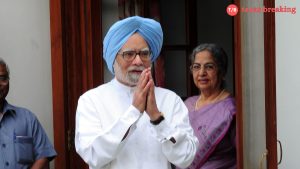Former Indian Prime Minister Manmohan Singh, renowned for his remarkable contributions to India’s economy and governance, passed away at the age of 92, igniting a wave of tributes from political leaders, industry professionals, and citizens alike. Hailed as a visionary, Singh’s tenure as Prime Minister from 2004 to 2014 saw significant financial reforms that reshaped a nation, influencing the lives of millions. His death marks not just a loss for India but also a pivotal moment in its historical narrative as people reflect on a leader who played a crucial role in introducing impactful policies.
Beyond Politics: A Leader’s Compassion
During his time in office, Singh was not only known for his economic insights but also for his deep understanding of social issues. Renuka Chowdhury, the first Union Minister for Women and Child Development, recalled Singh’s unwavering support for women’s rights, particularly highlighting his role in passing the Domestic Violence Act, a significant measure despite various challenges. Chowdhury remarked on how Singh championed causes that mattered to ordinary people, advocating for laws and protections that improved lives.
Economic Liberalization: Opening Doors for Growth
Singh’s journey in politics began with his reputation as an economist. As Finance Minister in the early 1990s, he spearheaded a series of reforms that opened India to the global market. By devaluing the Indian currency and reducing tariffs, Singh laid out a strategy that significantly boosted economic growth. Under his leadership, India saw its GDP grow rapidly, achieving an average rate of around 8% during his initial years as Prime Minister. This economic transformation reduced poverty and improved the living standards of many citizens.
The Balancing Act During Crises
One of Singh’s most challenging moments came during the global financial crisis of 2008. Through prudent economic policies, Singh’s government managed to shield India from severe repercussions, showcasing his adept leadership in difficult times. His capacity to navigate such challenges solidified his reputation as a capable and resilient leader, admired not only in India but also by international observers.
Legislative Milestones Under His Leadership
Aside from economic changes, Singh’s tenure also included landmark legislation to protect the rights of Indian citizens. Under his administration, laws were passed to guarantee fundamental rights like education and identity. The introduction of the Aadhaar project was one of these pivotal reforms aimed at bringing millions into the formal economy. Singh’s government placed an emphasis on ensuring that basic rights were accessible to all, reflecting his commitment to social development alongside economic progress.
Fostering International Relations
Another feather in Singh’s cap was his ability to strengthen India’s global ties, particularly with the United States and Russia. The historic nuclear deal with the U.S. in 2008 is a testament to his diplomatic skills and vision for a robust international presence. Singh believed in fostering relationships that could benefit India, not just economically but also strategically. Many leaders and diplomats acknowledged his efforts in bridging divides, creating partnerships that have had lasting effects on both regional and global scales.
A Legacy of Empathy and Understanding
Singh’s legacy goes beyond his economic achievements and legislative reforms; it includes his profound empathy and understanding of the human dimension of politics. He is remembered for having a personal connection with citizens, someone who truly understood their struggles and worked to address them. Villagers from Gah, Singh’s ancestral village now located in Pakistan, mourn his death, highlighting how Singh’s life and decisions resonated deeply with ordinary individuals far from the political spotlight.
A Nation Mourns
As tributes pour in from across the world, current Prime Minister Narendra Modi described Singh as a distinguished leader and economist, reflecting the widespread respect and admiration Singh garnered during his lifetime. Global leaders also recognized his impact on India and emphasized the mutual respect he fostered in international relations. From negotiations to economic strategies, Singh’s approach was marked by a deep commitment to progress and camaraderie.
| Key Contributions of Manmohan Singh | Impact |
|---|---|
| Economic Liberalization | Transformed India into a global economic player |
| Domestic Violence Act | Provided legal protection and support for women |
| Aadhaar Project | Established a unique identity system for citizens |
| Historic Nuclear Pact with the U.S. | Strengthened international ties and cooperation |
Manmohan Singh’s contributions to India and his role as a catalyst for change will inspire future generations. With a blend of intellect, empathy, and decisive action, Singh exemplified what it means to be a leader dedicated to the betterment of society. His passing reminds us of the importance of leaders who prioritize the needs of the people, marking an indelible chapter in India’s story that will be remembered for years to come.





